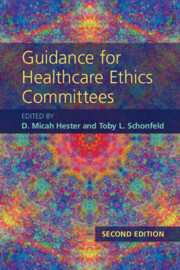Book contents
- Guidance for Healthcare Ethics Committees
- Guidance for Healthcare Ethics Committees
- Copyright page
- Dedication
- Contents
- Contributors
- Preface
- Section 1 The Context of Healthcare Ethics Committee Work
- Chapter 1 Introduction
- Chapter 2 Brief Introduction to Ethics and Ethical Theory
- Chapter 3 Healthcare Ethics Committees and the Law
- Chapter 4 Understanding and Addressing Health Disparities through a Racial Paradigm
- Chapter 5 Cultural and Religious Issues in Health Care
- Chapter 6 Moral Distress
- Section 2 Consultation
- Section 3 Policy Development and Organizational Issues
- Index
- References
Chapter 2 - Brief Introduction to Ethics and Ethical Theory
from Section 1 - The Context of Healthcare Ethics Committee Work
Published online by Cambridge University Press: 17 February 2022
- Guidance for Healthcare Ethics Committees
- Guidance for Healthcare Ethics Committees
- Copyright page
- Dedication
- Contents
- Contributors
- Preface
- Section 1 The Context of Healthcare Ethics Committee Work
- Chapter 1 Introduction
- Chapter 2 Brief Introduction to Ethics and Ethical Theory
- Chapter 3 Healthcare Ethics Committees and the Law
- Chapter 4 Understanding and Addressing Health Disparities through a Racial Paradigm
- Chapter 5 Cultural and Religious Issues in Health Care
- Chapter 6 Moral Distress
- Section 2 Consultation
- Section 3 Policy Development and Organizational Issues
- Index
- References
Summary
The term “ethics” originated with the Greek term ethikos meaning habit or custom; similarly, our word “moral” arose from the Latin mos, also meaning “custom.” But ethics (which we will not distinguish from “morality”) has certainly not come to mean the description of our “accustomed habits.” In fact, ethics is what we call a “normative” endeavor, meaning that ethics is not simply descriptive but prescriptive. While there are a variety of approaches to ethics that have been offered up over the centuries, all of them attempt to speak not to how we do live and act but to how we should live and act. Given the myriad uses and conceptions of what ethics is, though, it may help to discuss several of them in order to clarify better the purpose and work of a healthcare ethics committee.
- Type
- Chapter
- Information
- Guidance for Healthcare Ethics Committees , pp. 11 - 19Publisher: Cambridge University PressPrint publication year: 2022

